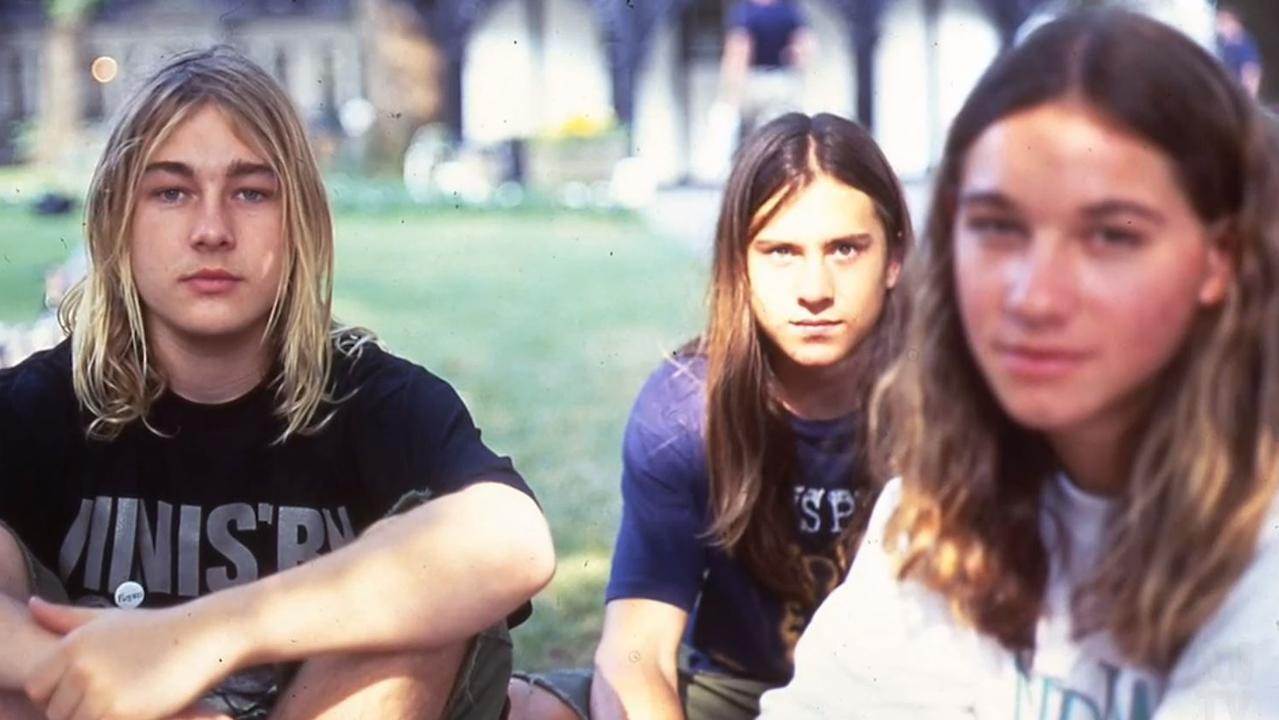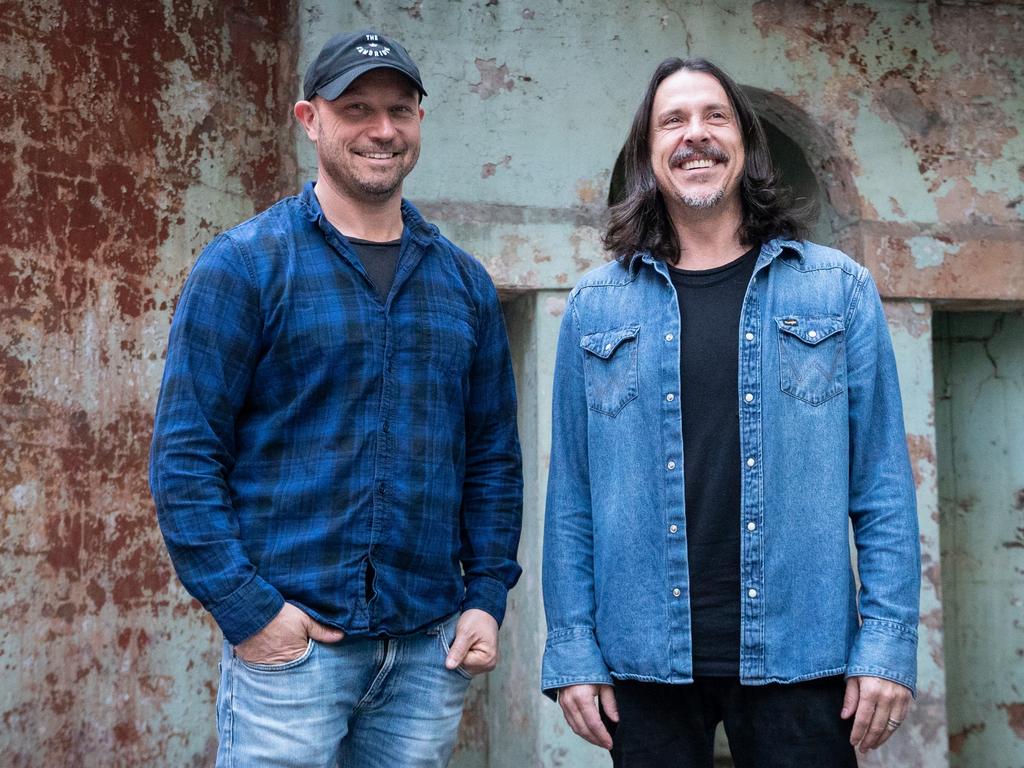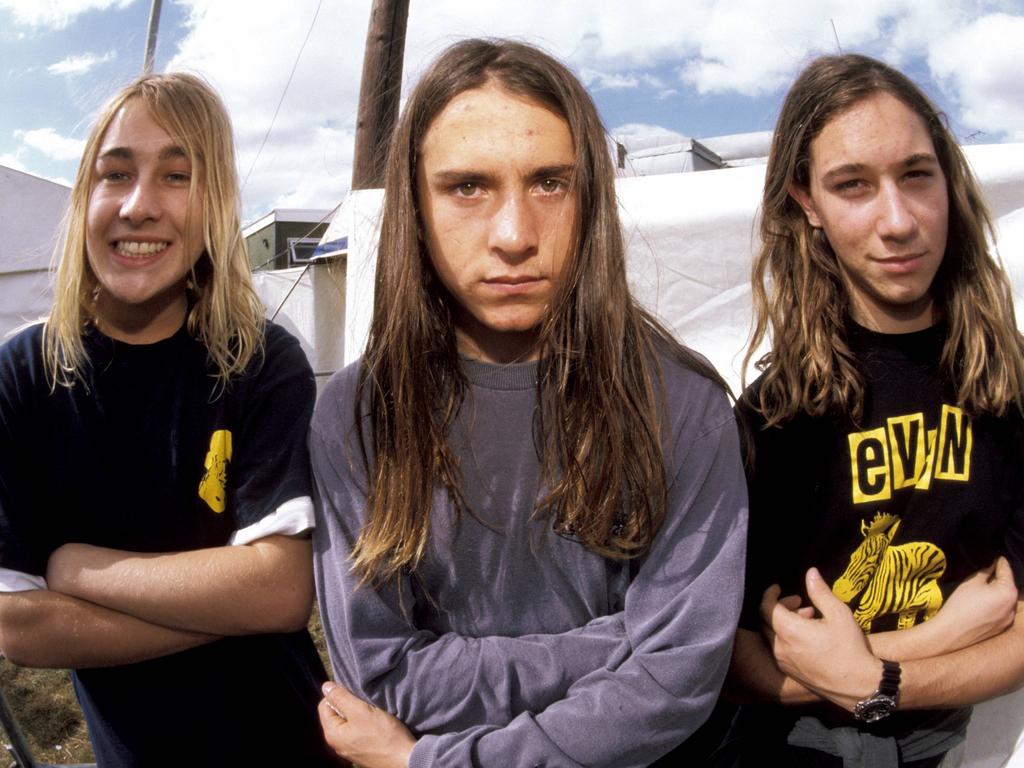Silverchair’s Ben Gillies and Chris Joannou lift lid on shock letter from Daniel Johns
“It hurt me”: Silverchair’s Ben Gillies has detailed the stunning letter he and bandmate Chris Joannou unexpectedly received from Daniel Johns.
Silverchair’s Ben Gillies has lifted the lid on the details of the band’s “D-Day”, revealing he and bassist Chris Joannou had been unexpectedly served with a stunning letter by frontman Daniel Johns.
“When Chris and I rocked up to Dan’s place, we didn’t know why we’d been summoned,” Gillies explained of the 2001 summit in his joint memoir with Joannou, Love & Pain, which was released today.
He claimed that Johns had written them a letter with his “plan for Silverchair going forward”, but tasked their manager, John “Watto” Watson, with reading it out to them.
“He wanted total creative control of the band. He wanted to be the sole writer and creator,” Gillies recalled.
“Yet it was only when we worked together – when I created drum parts, when Chris made his contributions – that we had the Silverchair alchemy.”
The decision came as a shock, as the band – which formed in 1992 when the three high school friends were in their early teens – had always collaborated on their music.
They got their big break in 1994 after being signed by Sony Music subsidiary, Murmur Records, and Silverchair’s debut album, Frogstomp, was released a year later, having been recorded in only nine days while the trio were aged just 15.
It became a number one album in Australia and New Zealand, and sold four million copies, paving the way for Silverchair’s enormous success.

Gillies went on to explain in the memoir that he believed Johns’ well-documented battle with an eating disorder at the time may have played a role in the situation.
“Control is an elusive concept. Humans tend to grasp at it when they feel like they least have it,” he wrote.
“Dan had been suffering from an illness, anorexia nervosa. It is not hard for me now, looking back, to see how this may have been related to the new development in the band.
“In order for him to feel safe, the band may have been the most obvious thing in his life to try to control.”
Despite his shock and sadness, Gillies says he agreed to Johns’ new terms.
“I wasn’t ready to give up on the band … I wanted to keep forging ahead,” Gillies wrote.
“I don’t think I realised it at the time because I just wanted to get on with things, but Dan’s letter knocked me.
“As his friend, it hurt me that he didn’t want to work together as closely. As his bandmate, it hurt that he didn’t want the same level of input from me. As a person, it hurt that he couldn’t look me in the eye to tell me those things.
“I can’t lie, it was a dent to my self-confidence, as an artist and a person.”
Johns was not involved with the memoir.

Meanwhile, Gillies insisted he didn’t “sit around wallowing in self-pity”, and that the group moved forward in their new direction from that day onwards.
“We had a record to make. Any record was better than none,” he pointed out.
The following year, Diorama was released, featuring singles including The Greatest View and Without You. While it was successful in the charts, it was not as well-received by critics as the rock band’s earlier albums.
Even so, it was certified triple-platinum and won five ARIA awards in 2002.
However, Joannou and Gillies’ friendship with Johns reportedly continued to decline, and the band eventually broke up in 2010 after going on an “indefinite hiatus”.
The sad reality of Silverchair’s final years has been laid bare in the new memoir and subsequent two-part Australian Story special, titled A Silver Lining, with Joannou and Gillies sharing their side for the first time.
During Part Two of the documentary, which aired on Monday night, Joannou admitted that the band’s disastrous live TV appearance in the US triggered the beginning of their downfall.
Silverchair was asked on to The Jay Leno Show to perform their hit single Straight Lines in 2007, but excessive partying beforehand had turned it into a “trainwreck”.
“Things came to a head when we did the Jay Leno show,” Joannou, 43, recalled. “We had been drinking reasonably heavily, all of us, and Daniel had lost his voice.
“It wasn’t our greatest performance, let’s just put it that way.”
“Straight Lines had the potential to reignite Silverchair in the US, but then the train started to get a little wobbly on the tracks,” Gillies added.
“It was probably the first time that the drinking had infiltrated the performances and life on tour.”

In their memoir Love & Pain, the pair went into detail about how Johns had “broken up the band” a number of times “only to change his mind”, sending them on an “emotional rollercoaster”.
However, after their appearance at the Groovin’ The Moo’ festival in 2010, “things were different”.
Gillies explained that he’d gotten a “confusing call” from Johns, who told him cryptically “it’s inevitable”.

When the drummer pressed his longtime friend and bandmate on his meaning, he claimed Johns changed the subject.
Meanwhile, Joannou claimed he “didn’t get a call from [Johns] himself”, instead finding out via the band’s manager John ‘Watto’ Watson that a press release announcing their “indefinite hiatus” was imminent.
“We wanted to scream. It shouldn’t have ended like that,” Gillies and Joannou wrote in the memoir.
“Even if the three of us weren’t aligned on the way to go forward together, we deserved to go out in a way that celebrated our achievements as a band. If it was really over, we deserved more than a press release that left everything floating in the ether, even if that was the agreed approach.
“At the very least, we owed it to ourselves to have a face-to-face adult conversation and make the decision together.”
Johns, 44, declined to be involved in the ABC documentary, but shared his side of the story on Sunday following issues over copyright and subsequent “unhelpful speculation”.
More Coverage
“I was asked at the end of filming to be interviewed about their contribution to the band and although I wished them all the best, I respectfully declined for one reason,” Johns wrote in a statement.
“I haven’t been involved in the book nor am I aware of the contents. I’ve been asked on many occasions to read the book but haven’t been sent a copy, consequently I was uncomfortable being interviewed to help promote it.
“ … I said to Sony and ABC that I would be open to approving all songs [for the documentary] provided I received a copy of the book to ensure I wasn’t having my songs used to promote something I had no visibility on. I was told again that Ben & Chris would not give me a copy to read. That’s why the iView use was denied.”






